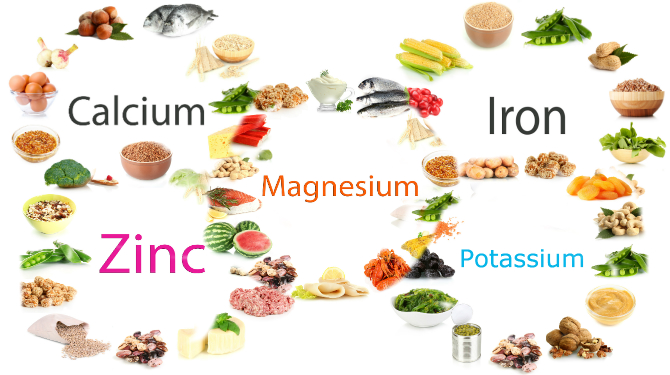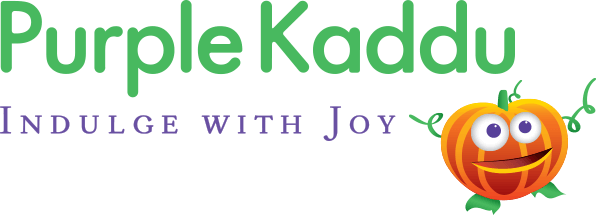
12 Essential Minerals for a healthy body

Minerals are micro-nutrients which are essential for maintaining good health. This article explains the roles/functions and food sources of various minerals that is needed by our body.
Calcium:
Every person is aware that calcium is required for strong bones and teeth! But that's not it. Calcium is essential for the contraction and relaxation of muscles,nerve function and clotting of blood.
Dairy calcium has been touted to help lose weight too. Foods rich in calcium include dairy and dairy products, Fish, Sesame seeds (Til), Ragi, green leafy vegetables.
Deficiency causes weak bones(osteoporosis).
Iron:
This mineral is required to make haemoglobin,for growth and development of body, immunity, memory, learning capacity and academic performance too.
Though present in both plant sources (such as Soyabean,pulses, green leafy vegetables, Halim seeds, Dates, Raisins, Watermelon) and also in animal sources(such as meat, seafood and poultry), animal foods are better sources of iron.
Deficiency causes anemia and poor immunity.
Magnesium:
This mineral helps convert food into energy, build strong bones, protect heart and help reduce stress.
Foods that will give you this mineral are almost all cereals, pulses, Amaranth, pink Radish, Lotus stem, Almonds, Cashewnuts, Walnut, Halim seeds, Mango.
Deficiency occurs very slowly and symptoms are anxiety, fatigue, insomnia, muscular problem, nausea and irregular heartbeat (arrhythmia) in extreme conditions.
Phosphorus:
It is the second most abundant mineral in our body after calcium. Phosphorus helps form strong bones along with calcium, manages how the body stores and uses energy, maintains and repairs tissues and cells, produce body’s genetic material (DNA and RNA) and maintain regular heartbeat.
Foods rich in this mineral are whole cereals particularly rice bran, wheat germ, pulses, nuts and oilseeds.
Deficiency of this mineral leads to poor bones, nerve disorders, respiratory problems and weakness.
Potassium:
This is an “electrolyte” mineral required for maintaining proper pH of blood, digestion, normal blood pressure, water balance, kidney and nerve function and smooth movement of muscles and energy production.
Good foods to get this mineral are Ragi, Bajra, Whole Wheat, almost all pulses, beans and nuts, Sweet Potato, Colocasia, Yam, Drumstick, Jackfruit, Lotus stem, green leafy vegetables, Carrots, Potatoes, fruits ( Apricots, Bananas, Bael fruit (Wood Apple), Chickoo and Peach).
Insufficient potassium in body causes kidney disease, magnesium deficiency, excess sweating, diarrhoea and vomiting.
Sodium:
Like potassium, sodium is also an electrolyte, which maintains water balance in body, helps in muscle contraction and relaxation and works with potassium to maintain normal blood pressure. Sodium sources are many and have to be taken in less quantity as excess causes high blood pressure.
Some common foods rich in sodium and to be taken in minimal quantity are table salt, bakery products, canned and processed foods. Fast foods and restaurant foods have more sodium than home foods.
Also insufficient sodium in body causes problems like low blood pressure, general muscle weakness/paralysis, mild fever and respiratory problems.
Iodine:
This mineral helps to convert food you eat into energy and is required for proper functioning of the thyroid gland.
Foods rich in iodine are fish (Cod and Tuna), Shrimp and other seafood and iodized salt. Fruits and veggetables often contain iodine from iodine rich soil they are grown in.
Deficiency causes a condition called hypothyroidism (enlarged thyroid gland which can be seen as a very swollen neck), dry skin, fatigue, weight gain. During pregnancy, if mother does not have enough iodine in her body then the child can have mental, speech and hearing defects.
Copper:
This mineral is important for the functioning of many enzymes in body and is present in red blood cells as well.
Food sources to look out for are Cocoa, Chocolate and Sesame seeds.
Insufficient copper in body causes change in hair colour and hair loss, problem in nervous system and bone disease.
Chromium:
Chromium is required for proper functioning of muscle and making insulin work better.
Rich food sources of it are cereals and nuts.
Deficiency gives rise to confusion, irritability, depression and tiredness.
Manganese:
This mineral helps in maintaining strong bones, fertility, healthy nerves and muscles and is a good anti-oxidant in body.
Foods rich in manganese are Ragi, Wheat flour, Green gram, Soyabean, Coconut and Arecanut.
Insufficiency of this mineral in body is rare but on occurrence causes reduced hair growth, rashes and other skin conditions and delayed growth in children.
Zinc:
It is required to maintain good immunity of body so that you don’t fall sick again and again, also for performance of many enzymes in body.
Good sources for this mineral are Chickpea, Bajra (Pearl Millet), Varai(Little Millet), Tur dal (Spilt Pigeon Pea), Cashewnuts, Sesame seeds.
Deficiency is rare and on occurrence causes increased risk of infections, delayed growth in children and skin lesions.
Selenium:
Coming in highlight recently, this mineral has been proved to have good antioxidant properties, making your immune system more effective and is known to possess other protective functions in body too.
Ragi, Bajra, Moong, Peas, Brussel sprouts, Cauliflower, Jackfruit, Watermelon are some very good sources of this mineral.
Deficiency generally affects bone joints and cartilage and causes cardiomyopathy (a condition which makes it harder for heart to pump blood to other parts of body).
Interaction of minerals with other nutrients and food components:
There are many factors involved in absorption and functioning of these minerals.Understanding these will help in a holisitc approach towards your health.
Calcium:
Vitamin D is required for absorption of calcium. Hence, sun bathing for atleast 15 mins is a must. High sodium intake( through excess consumption of processed foods, table salt) increases calcium excretion in urine. This calcium loss can increase fracture risk. Same is the case with excess phosphorus intake(through consumption of soda). Oxalates present in coffee, chocolate and green leafy vegetables interfere with calcium absorption. Hence, cold coffee, hot chocolate or palak paneer is not a good meal combination.
Iron:
When Calcium and Iron both are consumed together in a single meal, calcium reduces absorption of iron. Body thus does not avail of this mineral. Hence try and avoid consuming foods rich in these nutrients together. Copper and Vitamin B2 both help iron perform its role in the body. Tannins present in tea hinder iron absorption. Thus, excess intake of tea is not recommended. Consuming Vitamin C rich foods along with plant sources of iron, helps in better absorption of iron.
Magnesium:
Very high fibre diets decrease magnesium absorption.This shows that excess of any nutrient, whether good or bad, is not desirable.
Potassium:
When intake of potassium is sufficient, it decreases calcium loss.
Iodine:
Iodine plays an important role in the production of thyroid hormones(T4 and T3). The enzymes involved in T4 and T3 metabolism are dependent on selenium. Thus, iodine and selenium interact such that selenium deficiency, may lead to decreased production of thyroid hormones.
Chromium:
Diets high in simple carbs such as sugar, refined flour, glucose syrups etc. increase chromium excretion.
Zinc:
Vitamin A is dependent totally on zinc for it's transport across the body.
So now we believe you must have realized the importance of minerals in your daily diet, but wait popping a supplement won’t do good, it is still just supplementing your diet- not completing it. So we suggest you stick to food from Mother Nature and enjoy the benefits while munching on minerals!

















